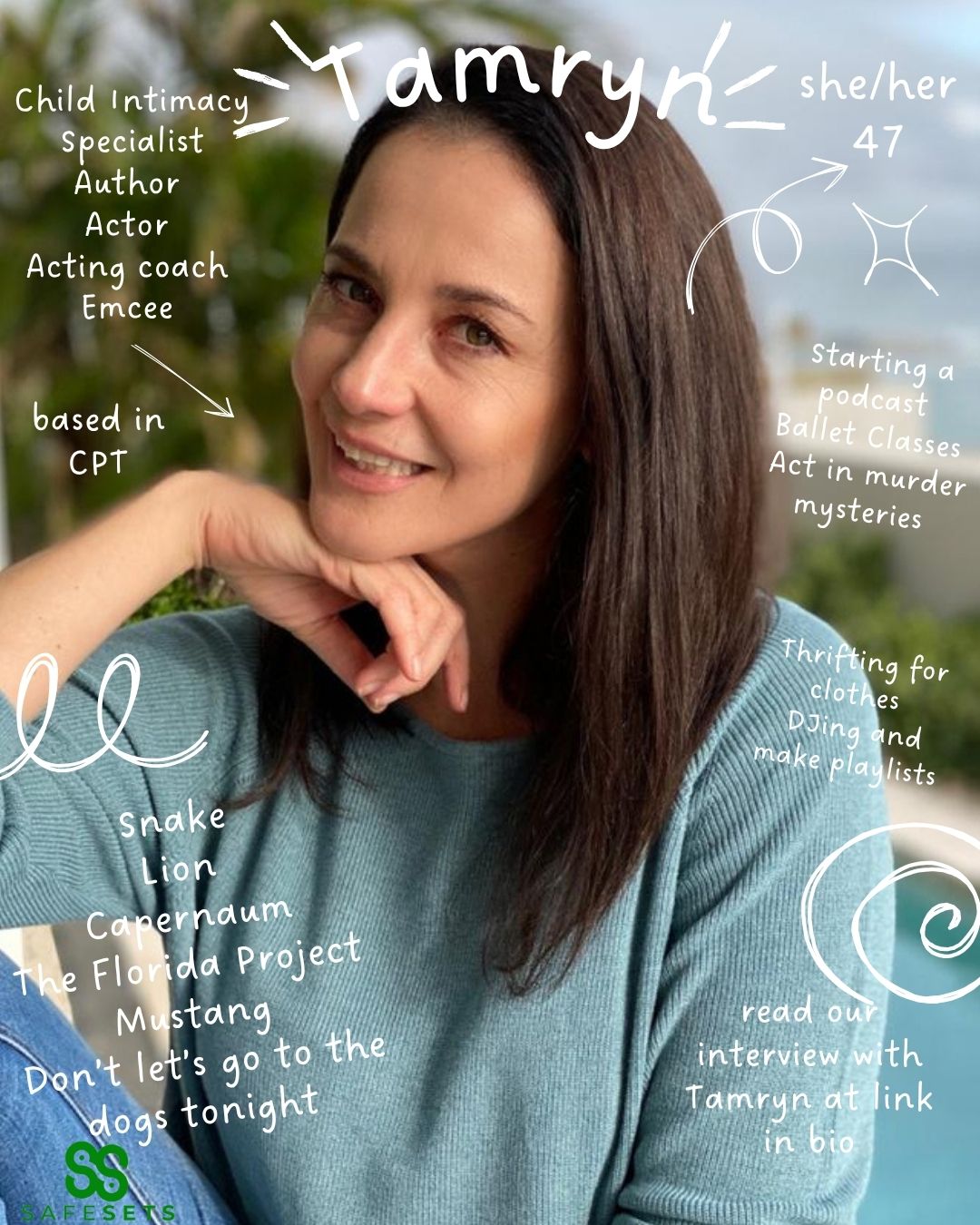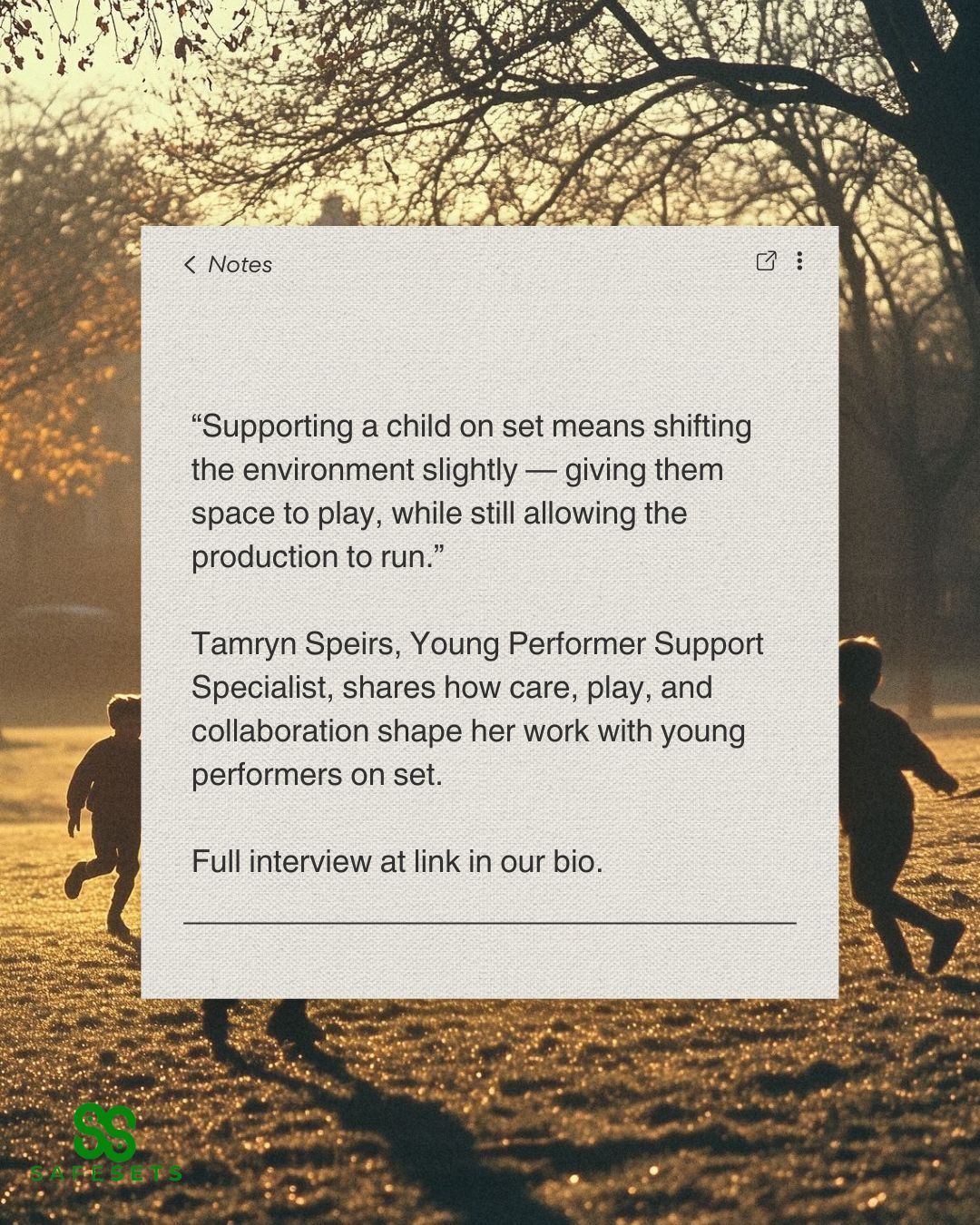Play, Safety, and Storytelling: How Tamryn Speirs Guides Young Performers
In the fast-evolving landscape of South African film and television, the welfare of young performers has become an increasingly urgent and complex issue. Productions now recognize that working with minors requires more than logistical compliance — it demands emotional intelligence, clear communication, and trauma-informed care.
At the forefront of this growing field is Tamryn Speirs, a respected film actress, director, acting coach, studio casting director, and Young Performer Support Specialist.
With over two decades of experience teaching, coaching, and directing children and adults alike, Speirs brings a rare combination of creative insight and pastoral care to film sets. Her approach integrates acting coaching, imaginative play, and evidence-based child protection protocols to help young performers navigate sensitive or potentially distressing material safely.
Having moved beyond the traditional "child intimacy" title, Speirs now defines her role as that of a Young Performer Support Specialist — someone who holds space for children through all stages of production: from script breakdown to on-set guidance. Her work focuses on diffusing traumatic or harmful content through reframing, play, and communication between the child, creative team, and guardians.
In this conversation with Carla Classen, Tamryn shares her philosophy, practices, and hopes for the future of young performer safety and creativity in South Africa's growing screen industry.
Carla Classen: Tamryn, how do you navigate the responsibility of holding a child's well-being on set?
Tamryn Speirs: That responsibility has been central to my work for 26 years. I began teaching when I was 20, and from the start, I understood that my role extended far beyond teaching performance — it was pastoral. It meant being responsible for the child's overall well-being, for ensuring that their emotional, psychological, and creative needs were all considered.
In drama, we ask students to be vulnerable, imaginative, and truthful. That means establishing very clear boundaries of safety and respect early on. What I learned in those years has deeply shaped how I now work on film sets. Interestingly, I don't feel that supporting children differs all that much from coaching adults - if you can treat someone well at 20, you can treat them well at 9.
What changes is the language and the framework. You need to understand a child's cognitive and emotional development, then tailor your communication accordingly. The magic of a creative space — whether classroom or set — lies in listening. When you truly listen to children, you learn how to meet them where they are. In class, I might ask them to imagine living in a sock drawer or flying on a leaf — and they take the story further than you ever could. That same listening and imaginative collaboration form the backbone of how I work with children on set.
Carla Classen: That's such a beautiful way to think about it.
Tamryn Speirs: Exactly. I always start by asking, "Where are you?" and then I let them lead. Their instincts guide me, and I build the framework around that.
I remember working with a four-year-old boy whose parents are both well-known Afrikaans actors. His role involved waking up alone in a dark, abandoned building — clearly not something we could approach literally. So, the director, Eva, and I reimagined the scene together. We turned it into a game — a dinosaur adventure with treasure maps and clues. The same physical actions took place, but his emotional landscape was one of excitement, not fear. By the end, his performance was truthful, spontaneous, and utterly safe.
That's what my work is about: defusing potentially traumatic or sensitive material through imaginative play, while preserving authenticity and artistry.
Carla Classen: That's such a smart approach.
Tamryn Speirs: Thank you. But it's always a collaborative effort. Ideas may come from the child, the director, or even the parents — what matters is the spirit of shared listening.
It takes alignment from the entire team — director, assistant director, crew, and guardians — to create a psychologically safe environment where the child feels supported. When everyone understands the intention behind each scene, we can reframe potentially distressing work in playful, empowering ways — ensuring the story is told, but never at the expense of the child's well-being.
Carla Classen: How do you approach working with young actors who are older, say 16 to 20?
Tamryn Speirs: Age is less relevant than readiness. Some 20-year-olds are still quite sheltered; others are emotionally mature far beyond their years. Likewise, a 16-year-old may have exceptional resilience, or they may need significant support.
What I always look at is context — their life experience, support systems, and whether they've been prepared for the emotional realities of storytelling. When we involve a Young Performer Support Specialist early in the process, before cameras roll, we can establish boundaries, plan for sensitive scenes, and prevent unnecessary stress or harm later. It's both compassionate and cost-effective for production.
Carla Classen: And how does this work feed back into your teaching?
Tamryn Speirs: It's completely interconnected. My work on set has transformed how I teach at ACT and in my private coaching practice. Whether I'm working with adults or children, my approach centres on holding space, trust, and play.
I've also reconnected with my own creative child through this work — that fearless little girl who wanted to lead, to create worlds, to tell stories. I think I've reclaimed that part of myself and allowed it to inform how I lead and teach others.
Carla Classen: What about children with special considerations, like trauma or neurodiverse needs?
Tamryn Speirs: This is a very important area, and one where boundaries are essential. I'm not a psychologist — and I never try to "treat" trauma. My role is to recognize, respect, and respond appropriately within a supportive framework.
That starts with careful casting: ensuring the child is emotionally ready and healthy for the role. In some cases, we bring in psychologists or child specialists to help assess that readiness. Once on set, my job is to be the first responder, facilitator, and advocate — someone who can spot early signs of distress, adjust the process, and maintain communication with the child, parents, and creative team.
The key is to ensure that a child's experience of storytelling never becomes re-traumatizing, but rather empowering and joyful — even when the material is dark or challenging.
Carla Classen: It seems like communication with the team and parents is critical.
Tamryn Speirs: Absolutely. The work succeeds only when it's shared. The Young Performer Support Specialist doesn't operate in isolation — it's a networked system of care.
Before shooting begins, we establish baselines: what the child can handle, what language or imagery to avoid, what preparation might be needed. I often facilitate pre-set workshops with parents or guardians, so they understand the process and can support the child effectively. That shared understanding helps everyone — and it means the child feels seen, heard, and held by a consistent structure of care throughout production.
Carla Classen: How do you see the role of a child intimacy or young performer specialist evolving in South Africa?
Tamryn Speirs: We're at the beginning of something incredibly important. I'd love to see the role evolve into a consulting arm of the industry — a specialist you can call, much like a GP, to assess, guide, and design support structures for productions involving minors.
During my research for our book, Directing children for screen, a filmmaker's guide (Routledge 2026), Meg Rickards and I started finding individuals across the globe who are already doing what I am doing. Acting coaches and child specialists working alongside directors in this way — it is incredible that it hasn't been recognised by the industry at large or producers yet as a needed position, and yet individuals are already trailblazing this!
Right now, we are building that framework slowly, but there's real momentum. The more we formalise and train for it, the safer and more consistent the work becomes. It's about protecting the child while preserving the creative integrity of the project. When those two things work hand in hand, the results are extraordinary.
Tamryn Speirs' work underscores the importance of preparation, play, and psychological safety in supporting young performers. By listening deeply, collaborating closely with production teams, and creating structured frameworks of care, she ensures that children on set are not only safe but empowered to deliver their best performances. In a growing industry, her approach offers a blueprint for integrating care, creativity, and professionalism — one imaginative game at a time.
Interviewed October 2025 by Carla Classen


